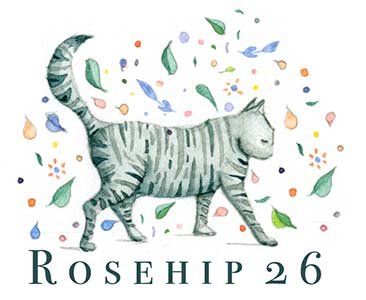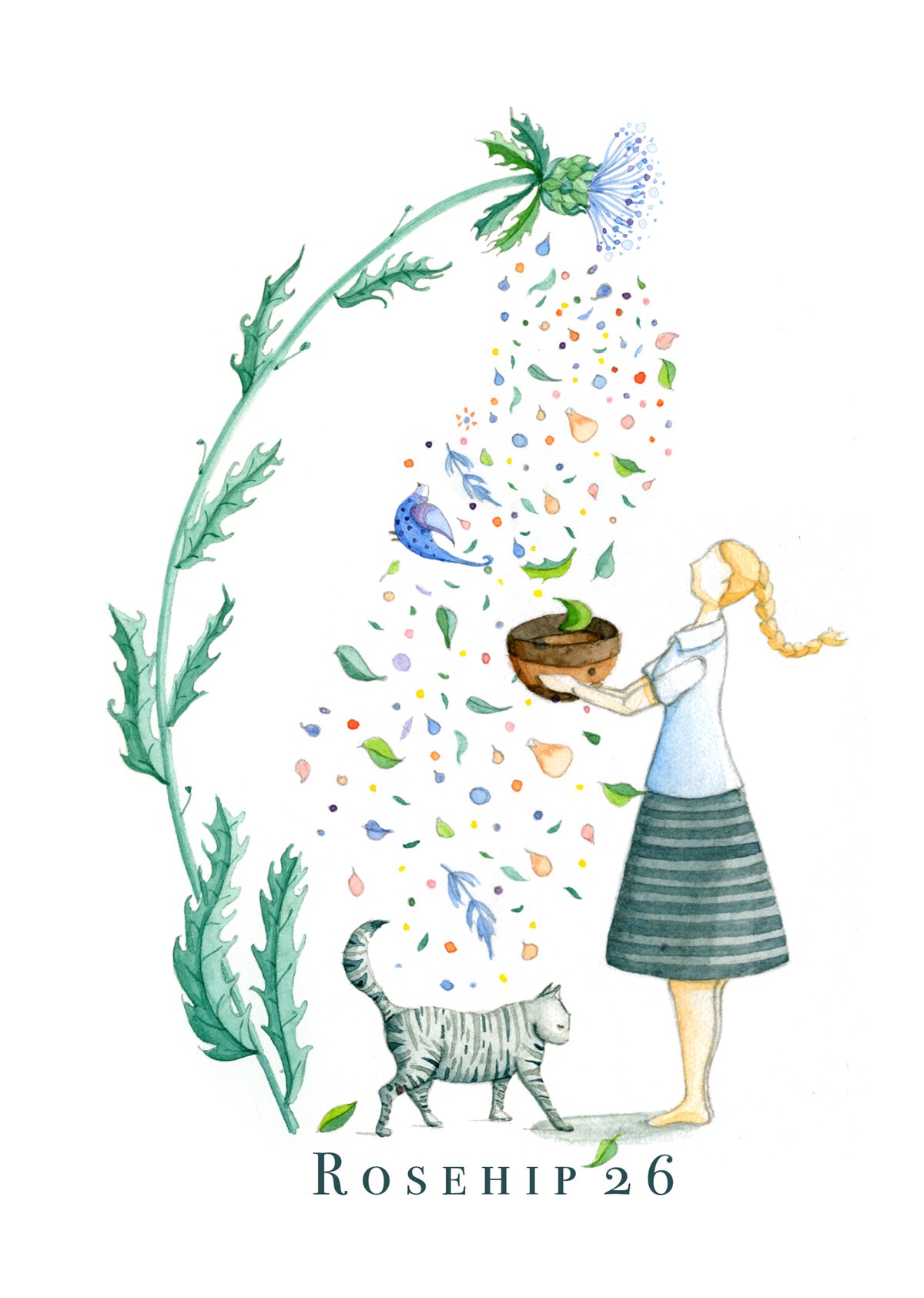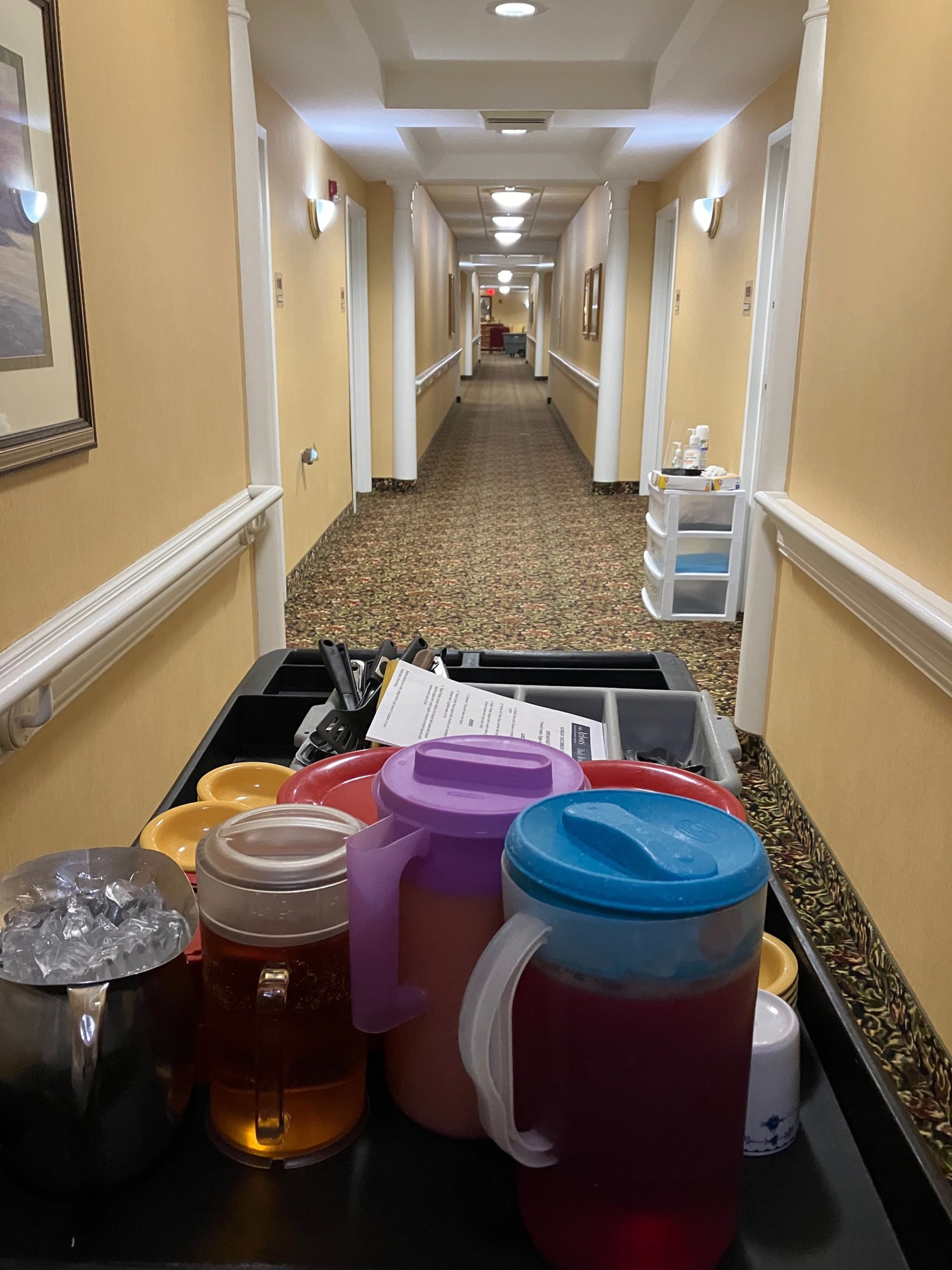Lessons from Food Services in Assisted Living
Food Services as a Spiritual Practice with many lessons and gifts
“I asked a woman what she would like to order and she said, “happiness.” I asked her to open her hands for me and make a little bowl with them. She did. I scooped up happiness energy and placed it in her bowl. I asked her to pour it over her head. She smiled as she received happiness. On my last day - she did the same for me. ”
In Fall 2021, I resigned from a 33-year career in health care sustainability. Five days later, I was on the Big Island of Hawaii, volunteering on an agroforestry project. I went on a vision quest and my memoir, “Field Notes on Letting Go” was birthed. I recorded the audiobook, received certification as a master of shamanic energy medicine and released a 13-part workshop, “Read, Write & Release,” which pulled together the foundation of my healing – nature, writing and a kundalini yoga spiritual practice – into one workshop. 2023 was a year of soul alignment and following my soul’s calling – it didn’t feel like work. This was how I wanted to live my life.
One problem. And it was a big one. It wasn’t paying the bills. So now what?
I didn’t regret giving up my career, but I needed a job.
I love kitchens. Is there a better place to be with others? Cooking, creating, listening to music, and talking with each other – laughing, jokes and serious conversations. I like how kitchens throw a diverse set of people together – people who otherwise may not be hanging out. I love that about kitchens.
I found a job working in Food Services at an assisted living facility less than two miles from my home. I served breakfast and lunch to the 80 or so residents. There were two breakfast shifts, a break and then two lunch shifts and in-between serving, I prepared food – muffins, cut fruit, cookies.
And since I let my car go two years ago, it worked because I could ride my bike (and walk when icy.) The hours were 7 am to 2:30 pm – my kind of hours. I could still get up pre-dawn for my kundalini yoga practice and then head to work. While the pay was low, I could eat there so it reduced food costs. I worked per diem, starting two days a week and moving to 4 to 5 days a week. I netted $100 a day. It was such a specific amount – it let me think about things I needed as a day’s work. A gift for one of my kids? A day’s work. Going out for dinner – a half day’s work. It helped me look at my costs and finances as time and the measure was my over 12,000 steps – hustling nonstop for 7 and a half hours. It was hard work to earn that $100 and I was protective of it. Shopping for what I needed, versus what I wanted, was getting easier.
Right away, I knew it was a spiritual practice – I mean – life IS a spiritual practice – life IS the adventure – but this job was a brand-new experience for me. It had to be a spiritual practice because it was hard and I wanted to see it as my teacher. I was the oldest worker in the group and my memory, physical strength, and endurance showed it. I had trouble keeping track of all the nuances around' people’s specific requests for drinks and food preferences and was exhausted at the end of the day. Those first few days I had to lie down after work – I was toast!
The assisted living facility is a learning laboratory. It is an exaggeration of the human experience. I am a sensitive creature – feel people’s comments, actions and energy and it can hurt. I started practicing the art of letting things roll off my back. Dementia, Alzheimer’s, and the aging process in general make for discomfort. With confusion and discomfort come fear, anger, lashing out and the need for repetition of the same information – patience.
When someone is “mean” or “unkind” to me – for example – I’m too slow, made a mistake or served something in a different way than they imagined, my natural reflex was to feel hurt, frustrated, impatient or angry and maybe meet their quip with my own comment – but no. That was over. My practice was that no matter how I was treated or what was said to me – no matter how hurtful it may have felt – I was learning to use humor, breath and nonreaction. It felt new. It was a muscle that needed developing. It was the perfect place to practice for the rest of my life and relationships.
At first, as I served people in the dining hall, I treated them pretty much the same. I didn’t know that I would be serving people in different ways. The dining room microcosm taught me about people and life. Everyone is different. And I am starting to learn differences. I couldn’t tell by mere observation of the differences. It didn’t have anything to do with how someone looked or what their name was or where they sat. I learned that different people like to be approached in distinct ways – and it kept people calmer. One man was angry when rushed. I used to think he was just mean. With practice, I learned and could see that he was scared. It was too fast. I learned to bring him his coffee. I made sure the menu was in front of him. I reminded him how to access the cream and sugar and then walked away. I brought him an orange juice and only then did I let him know about the meal specials and ask what he wanted to order. While I had trouble keeping up with everyone’s orders, going faster was not the solution for some.
Others knew exactly what they wanted. I learned to arrive with their beverage in hand and a pen ready to order. Some ordered the same thing every breakfast and others liked variety but had very specific and strong opinions about what those things were. Chocolate in a pancake? Disgusting and they were fine letting me know.
Some were sweet and funny – others confused – and a few - difficult. And it’s all okay. I learned to slow down and place the plate in front of them with intention, even turning it around for the nicest view. I made sure they had their napkin and their silverware. I reminded them what was on their plate and what the salad dressing was for or how some liked ketchup on French fries and some liked syrup on pancakes. Some liked the menu read to them, some could read perfectly well, thank you very much. On a broader scale, this taught me of the personal preferences inherent in all of us and the need to approach space and engagement carefully and to be patient as we adjust to each other’s needs and preferences.
If we are in survival mode, we may not spend as much time thinking about the approach that works best for others – we may be focused on our own safety and security and what works best for our own survival. This experience helped me tread more carefully with the world – with friends – with neighbors and strangers. Just because I had my own way of operating in the world – didn’t mean everyone else operated in the same way. And as I learn that I am safe and I don’t have to push my way through the life experience, I can tread more gently and be mindful and careful of how I approach others. I thought what worked for me worked for others. Not true.
One of my favorite memories was when I asked a woman what she would like to order and she said, “happiness.” I asked her to open her hands for me and make a little bowl with them. She did. I scooped up happiness energy and placed it in her bowl. I asked her to pour it over her head – and she did. She smiled as she received happiness. On my last day - she did the same for me.
When some of the residents learned that I was going to Hawaii, they didn’t believe me when I said I would think of them. I do think of them. I think of them with a smile. The other night, up by the Ironwood tree, I named every single resident’s name aloud, honoring them. I felt confident that I got them all because I pondered table by table through the assigned seating in my mind’s eye.
I took the job to pay my bills.
I didn’t know I would learn the names of so many people, get to know them - learn about their kids, their career, their life partners and the nicknames that their partner called them - like Honey Bun. Once when I called someone that - she told me that her deceased husband called her that - so we started calling each other Honey Bun.
It also showed me - in all the losses that I have had in my life - that no one is void of losses - everyone in that dining hall knew about loss. And they knew that they were at the end of their time on this planet. They represented all of us.
Thank you for the lessons. Thank you for the gifts. Ong namo guru dev namo - we bow to our teachers.
May we all scoop happiness into each other’s open hands.


